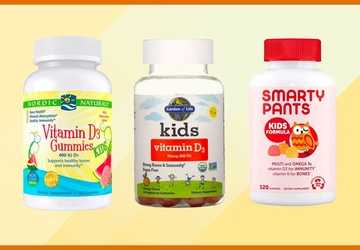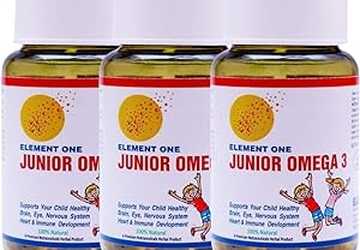5 Key Nutrients for Supporting Children's Brain Development
Do you worry about your child's brain development? Living in a world where everything is based on cognitive abilities, ensuring your youngster's brain receives the perfect nourishment is critical. Babies' brains are comparable to sponges that absorb everything.
Do you worry about your child's brain development? Living in a world where everything is based on cognitive abilities, ensuring your youngster's brain receives the perfect nourishment is critical. Babies' brains are comparable to sponges that absorb everything.
As parents, we do our utmost to help our children develop in a favorable environment. However, you were unaware that nutrition plays a significant influence on their cognitive development. Discover how you may improve your child's brain well-being with optimal nourishment.
Imagine a quintessentially brilliant future: your kid deserves to be ahead of the curve when it comes to schooling and the arts. Assuming we provide them with the right tools, the opportunities are infinite.
Stay tuned to learn about five vital nutrients that may change your child's learning experience.
Why Optimal Brain Development Matters?

Ensuring your child's brain develops optimally isn't only about their success in school but also a guarantee for a successful life.
Imagine your child learning with their well-nourished brain; how intelligent will they be? How good will their emotional intelligence be, among other factors?
By availing the nutritional requirements for your child's brain, you lay the ground for improved cognitive function, memory, and problem-solving ability, among others.
Ensure your child's brain will help set them up for success and happiness in the future. Equipping your child with the best gifts on their nutritional journey will guarantee that they remain successful in a digital world.
The following are vital nutrients that will ensure a massive difference in your child's brain development.
5 Key Nutrients for Supercharging Your Child's Brain
We have discovered some crucial nutrients that can supercharge and revive your child's brain. Here is how they work to enhance your child's academic excellence, creativity, and critical thinking.
1. Omega-3 Fatty Acids
Omega-3 fatty acids, specifically EPA and DHA, are essential for brain health. They are readily available in foods such as fatty fish like salmon, mackerel, and sardines.
Omega-3 fatty acids are needed to create brain cell membranes, transmit signals between neurons, and support general cognitive function. Research has linked omega-3 intake in children to better academic achievement and mental abilities.
If your child dislikes fish, Omega-3 supplements or adding flaxseeds, chia seeds, walnuts, and hemp seeds to their diet as alternative sources could help.
2. Iron
Iron is crucial to the supply of oxygen to the brain, the formation of neural connections, and all aspects of cognitive function.
Cognitive deficits, including poor memory, attention deficits, and reduced learning ability in infants and children, are all linked to a lack of iron very early in life.
Lean meats, poultry, fish, lentils, beans, fortified cereals, and spinach are high in foods.
3. Vitamin D

Vitamin D is essential to brain function and influences brain development. The vitamin regulates the synthesis of neurotransmitters that control a person's mood and various cognitive processes.
Moreover, its deficit causes an increased likelihood of such neurodevelopmental conditions as autism and ADHD.
Some natural sources also provide vitamin D. They include sunlight, fish, dairy products, and egg yolks.
Nevertheless, consuming food with a high concentration of the vitamin might be insufficient in cases of weak sunlight in a particular region. In this case, supplements may be prescribed after consulting a doctor.
4. Zinc
Zinc is critical for multiple functions in the brain, such as neurotransmission, synaptic plasticity, and memory mechanisms. Children require proper zinc intake for cognition and learning facilitation.
Zinc sources include lean meat, poultry, seafood, legumes, nuts, seeds, and wholegrain. Therefore, a well-structured meal will help boost children's thinking and overall brain performance.
5. Choline
This is an essential nutrient that contributes to the synthesis of acetylcholine. This neurotransmitter is vital for memory and cognitive processes.
Moreover, this nutrient is necessary for the formation of tissues in the brain during fetal development and in the first years after a child's birth.
Therefore, adding choline-rich products to a child's diet would be helpful. These products include eggs, most meats, fish, dairy foods, broccoli, and Brussels sprouts.
Empower Your Child's Future: Take Action Now for Brain Health!
Now that you know, it's time to take action. Start incorporating the nutrients above in your child's diet for a brighter future. Your child's brain health should not be compromised.
Do something now, no matter how small, that will go a long way in making sure your child grows to their full potential. The next time your child struggles to remember something, don't beat yourself up.
Remember, it's nutrition! Ring the change, smile, and watch you seek their full knowledge. Workers begin as dreamers! It's possible with a healthy brain.





